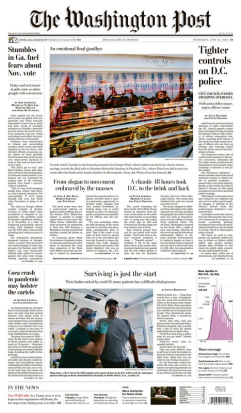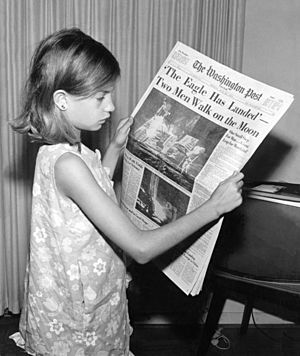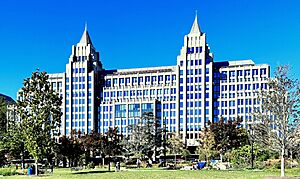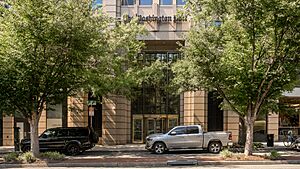The Washington Post facts for kids
| Democracy Dies in Darkness | |

The Washington Post print edition on June 10, 2020
|
|
| Type | Daily newspaper |
|---|---|
| Format | Broadsheet |
| Owner(s) | Nash Holdings (Jeff Bezos) |
| Founder(s) | Stilson Hutchins |
| Publisher | William Lewis |
| Founded | December 6, 1877 |
| Language | English |
| Headquarters | One Franklin Square, 1301 K Street NW, Washington, D.C., U.S. |
| Country | United States |
| Circulation |
|
| ISSN | 0190-8286 |
| OCLC number | 2269358 |
The Washington Post is a well-known American newspaper. It is published every day in Washington, D.C., which is the capital city of the United States. Many people in the Washington area read it, and it is also read by people across the country. In 2023, the Post had 130,000 print readers and 2.5 million digital readers. This made it the third largest newspaper in the U.S. for both print and digital readers. Only The New York Times and The Wall Street Journal had more readers.
The Post was started in 1877. In its early years, it had different owners and faced financial challenges. In 1933, a businessman named Eugene Meyer bought the newspaper when it was in trouble. He helped it become successful again. His daughter, Katharine Graham, and her husband, Phil Graham, continued this work.
The Post became famous for its important reporting. In 1971, it printed the Pentagon Papers, which were secret government documents. This helped people understand more about the Vietnam War. Later, reporters Bob Woodward and Carl Bernstein investigated a break-in at the Democratic Party offices. This investigation led to the Watergate scandal and the resignation of President Richard Nixon in 1974.
In 2013, the Graham family sold the newspaper to Nash Holdings, a company owned by Jeff Bezos. He bought it for $250 million.
The newspaper has won the Pulitzer Prize 76 times. This is a very important award for journalism. Only The New York Times has won more. The Post is known for its political reporting. It is also one of the few American newspapers that still has reporters in other countries. These reporters cover international news from places like London and Seoul.
Contents
About The Washington Post
The Washington Post is one of the top daily newspapers in the United States. It is often mentioned alongside The New York Times and The Wall Street Journal. The Post is especially known for its reporting on the U.S. government. This includes news about the White House and Congress.
The Post mainly prints newspapers for readers in Washington, D.C., and nearby areas in Maryland and Virginia. It used to have a national weekly edition, but that stopped in 2009.
The newspaper has reporters in many cities around the world. These include Beijing, Berlin, Brussels, London, Mexico City, Moscow, and Tokyo. In 2009, the Post closed some of its U.S. offices in cities like Chicago and New York City. This was to focus more on political news in Washington, D.C., and local news.
As of March 2023, the Post printed about 139,232 copies on weekdays. This made it the third largest newspaper in the country by how many copies it printed.
For many years, the Post had its main office at 1150 15th Street NW. In 2014, the Post moved to a new leased office. This new office is at One Franklin Square in Washington, D.C.
The Post also has a special events business called Washington Post Live. This group organizes political discussions and news events.
History of The Post
Early Years (1800s)
The newspaper was started in 1877 by Stilson Hutchins. In 1880, it became the first newspaper in Washington, D.C., to publish seven days a week. This included a Sunday edition.
In 1878, The Washington Post bought another newspaper called The Washington Union. For a short time, the combined newspaper was called The Washington Post and Union.
In 1889, Hutchins sold the newspaper to Frank Hatton and Beriah Wilkins. To help promote the newspaper, they asked John Philip Sousa to write a march. Sousa was the leader of the United States Marine Band. He wrote "The Washington Post" march. This music became very popular for a dance called the two-step. It is still one of Sousa's most famous songs.
In 1893, the newspaper moved to a new building. This building brought all parts of the newspaper together. The newsroom, advertising, and printing were all in one place.
During the Spanish–American War in 1898, the Post printed a famous drawing by Clifford K. Berryman. It was called Remember the Maine. This drawing became a rallying cry for American sailors during the war. Berryman also drew another famous cartoon in 1902. It showed President Theodore Roosevelt being kind to a small bear cub. This cartoon inspired someone to create the teddy bear.
The 20th Century

After Wilkins passed away in 1903, his sons ran the Post for two years. Then, in 1905, they sold it to John Roll McLean.
When McLean died in 1916, he put the newspaper into a special trust. He did not think his son, Edward "Ned" McLean, could manage it well. Ned went to court and gained control, but under his leadership, the newspaper struggled.
In 1933, a businessman named Eugene Meyer bought the Post at an auction. He paid $825,000 for it. Meyer helped the Post become strong and respected again. In 1946, his son-in-law, Philip Graham, took over as publisher.
Meyer's family later bought and merged the Post with another newspaper called the Times-Herald in 1954. For a while, the paper was officially called The Washington Post and Times-Herald.
After Philip Graham's death in 1963, his wife, Katharine Graham, took control. She was Eugene Meyer's daughter. It was unusual for a woman to run a major national newspaper at that time. Katharine Graham was the publisher from 1969 to 1979.
Katharine Graham made The Washington Post Company a public company in 1971. This meant people could buy shares of the company. She also oversaw the company buying Kaplan, Inc., an education and training company, in 1984. Kaplan later became a very important part of the company's income.
Executive editor Ben Bradlee supported reporters Bob Woodward and Carl Bernstein. They wrote many articles about the 1972 break-in at the Watergate complex. The Post's strong reporting on this story helped lead to President Richard Nixon's resignation. The newspaper won a Pulitzer Prize in 1973 for this work.
In 1972, the "Book World" section was added. It featured many talented writers. This section was stopped as a separate part of the paper in 2009, but book reviews are still published in other sections.
Donald E. Graham, Katharine's son, became publisher in 1979.
In 1995, the website washingtonpost.com was created. The first full website for the newspaper launched in June 1996.
The Jeff Bezos Era (Since 2013)

In August 2013, Jeff Bezos, the founder of Amazon, bought The Washington Post. He paid $250 million for the newspaper and other related businesses. The company that used to own the Post was renamed Graham Holdings.
Nash Holdings, the company that owns the Post, is separate from Amazon. Bezos said he wanted to help the Post focus more on digital news for readers across the country and the world.
In 2015, the Post moved to its current leased office at One Franklin Square. Since 2014, the Post has started new online sections, blogs, and podcasts. In 2020, the Post won a Webby People's Voice Award for its news and politics content online.
In 2017, the newspaper hired Jamal Khashoggi as a columnist. Sadly, Khashoggi was murdered in 2018.
In October 2023, the Post announced it would reduce its staff by offering voluntary separation packages. This was due to lower than expected growth in readers and advertising. The Post had lost about 500,000 subscribers since late 2020.
In May 2024, the CEO, William Lewis, announced that the newspaper would use artificial intelligence to help improve its financial situation.
In June 2024, there were reports of some internal challenges at the Post. The new CEO, William Lewis, faced some concerns about his leadership. There were also changes in top editorial positions. The newspaper is working to gain back readers and improve its finances.
In January 2025, the Post announced it would lay off a small number of staff, less than 100 people. Newsroom employees were not affected.
Political Stance
20th Century Stance
In 1933, when Eugene Meyer bought the Post, he promised the newspaper would not favor any political party. However, as a leading Republican, his views sometimes influenced the paper's editorials.
In 1946, Phil Graham became the Post publisher. During this time, the Graham family became friends with important political figures.
The Post is known for creating the term "McCarthyism" in a 1950 cartoon. This term described unfair attacks or smear campaigns against people.
Ben Bradlee became the editor-in-chief in 1968, and Katharine Graham became the publisher in 1969. This led to the strong reporting on the Pentagon Papers and the Watergate scandal. The Post helped increase public opposition to the Vietnam War in 1971 by publishing the Pentagon Papers. In the mid-1970s, some critics called the Post "Pravda on the Potomac". This was because they thought the newspaper had a left-leaning bias in its reporting and opinions.
21st Century Stance
Before the Iraq War, some critics noted that the Post published many articles that supported the idea of invading Iraq.
In 2007, journalist Chris Matthews said that The Washington Post was no longer as liberal as it used to be. The newspaper regularly publishes opinion pieces from both left-leaning and right-leaning writers.
In 2009, a study showed that both liberal and conservative bloggers often linked to The Washington Post and The New York Times.
Since 2011, the Post has a column called "The Fact Checker." This column checks if statements are true. It has received grants to expand its video fact-checking.
In February 2017, the Post adopted the slogan "Democracy Dies in Darkness" for its masthead.
Political Endorsements
In most U.S. elections, the Post editorial board has supported Democratic candidates. The editorial board's decisions are separate from the newsroom. The Post did not regularly endorse presidential candidates until 1976. Since then, it has supported Democrats for president. It has never endorsed a Republican for president in the general election. For example, it endorsed Barack Obama in 2008 and 2012, Hillary Clinton in 2016, and Joe Biden in 2020.
While the newspaper mostly supports Democrats in other elections, it has sometimes endorsed Republican candidates. For example, it supported some moderate Republicans in Virginia and Maryland.
2024 Change in Presidential Endorsements
Eleven days before the 2024 presidential election, CEO William Lewis announced that the Post would not endorse a candidate for president. This was the first time since 1988 that the paper did not endorse the Democratic candidate. Lewis also said the paper would not make endorsements in any future presidential elections. He stated that this was a way for the paper to "return to our roots" and support readers in making their own decisions.
This decision was criticized by some former editors and columnists. They felt it was a mistake. Some sources suggested that the owner, Jeff Bezos, blocked an endorsement for Kamala Harris. Following this decision, some readers canceled their subscriptions.
How The Post is Organized
Leaders and Editors
Major Owners
- Stilson Hutchins (1877–1889)
- Frank Hatton and Beriah Wilkins (1889–1905)
- John R. McLean (1905–1916)
- Edward (Ned) McLean (1916–1933)
- Eugene Meyer (1933–1948)
- The Washington Post Company (1948–2013)
- Nash Holdings (Jeff Bezos) (since 2013)
Publishers
- Stilson Hutchins (1877–1889)
- Beriah Wilkins (1889–1905)
- John R. McLean (1905–1916)
- Edward (Ned) McLean (1916–1933)
- Eugene Meyer (1933–1946)
- Philip L. Graham (1946–1961)
- John W. Sweeterman (1961–1968)
- Katharine Graham (1969–1979)
- Donald E. Graham (1979–2000)
- Boisfeuillet Jones Jr. (2000–2008)
- Katharine Weymouth (2008–2014)
- Frederick J. Ryan Jr. (2014–2023)
- William Lewis (since 2024)
Executive Editors
- James Russell Wiggins (1955–1968)
- Ben Bradlee (1968–1991)
- Leonard Downie Jr. (1991–2008)
- Marcus Brauchli (2008–2012)
- Martin Baron (2012–2021)
- Sally Buzbee (2021–2024)
- Matt Murray (since 2024)
Journalists
Some current journalists at The Washington Post include: Dan Balz, Robin Givhan, David Ignatius, and Ashley Parker.
Some former journalists include: Mary McGrory and Bob Woodward.
Publishing Technology
Arc XP is a part of The Washington Post. It provides a special publishing system and software for other news organizations.
Unions at The Post
In 1975, the Washington Post pressmen's union went on strike. The Post hired new workers to replace them.
In June 2018, over 400 employees of The Washington Post signed a letter to Jeff Bezos. They asked for fair wages and benefits. They said that salaries were not increasing enough, even though the newspaper was growing.
As of 2023, the Washington Post Guild represented about 1,000 staff members. In December 2023, more than 750 journalists and staff went on strike. They said the company was not negotiating fairly on issues like pay and remote work. Later that month, the union reached a new three-year contract with the paper.
In May 2025, many technology workers at the Post voted to form a union. This union, called the Washington Post Tech Guild, represents over 300 workers.
More About The Post
- 1975–76 Washington Post pressmen's strike
- All the President's Men, a 1974 book about the Watergate scandal
- All the President's Men, a 1976 movie based on the book
- List of prizes won by The Washington Post
- The Post, a 2017 movie about the publication of the Pentagon Papers
- The Washington Star (a newspaper that existed from 1852–1981)
- The Washington Times (a newspaper that started in 1982)
See also
 In Spanish: The Washington Post para niños
In Spanish: The Washington Post para niños
 | Isaac Myers |
 | D. Hamilton Jackson |
 | A. Philip Randolph |


